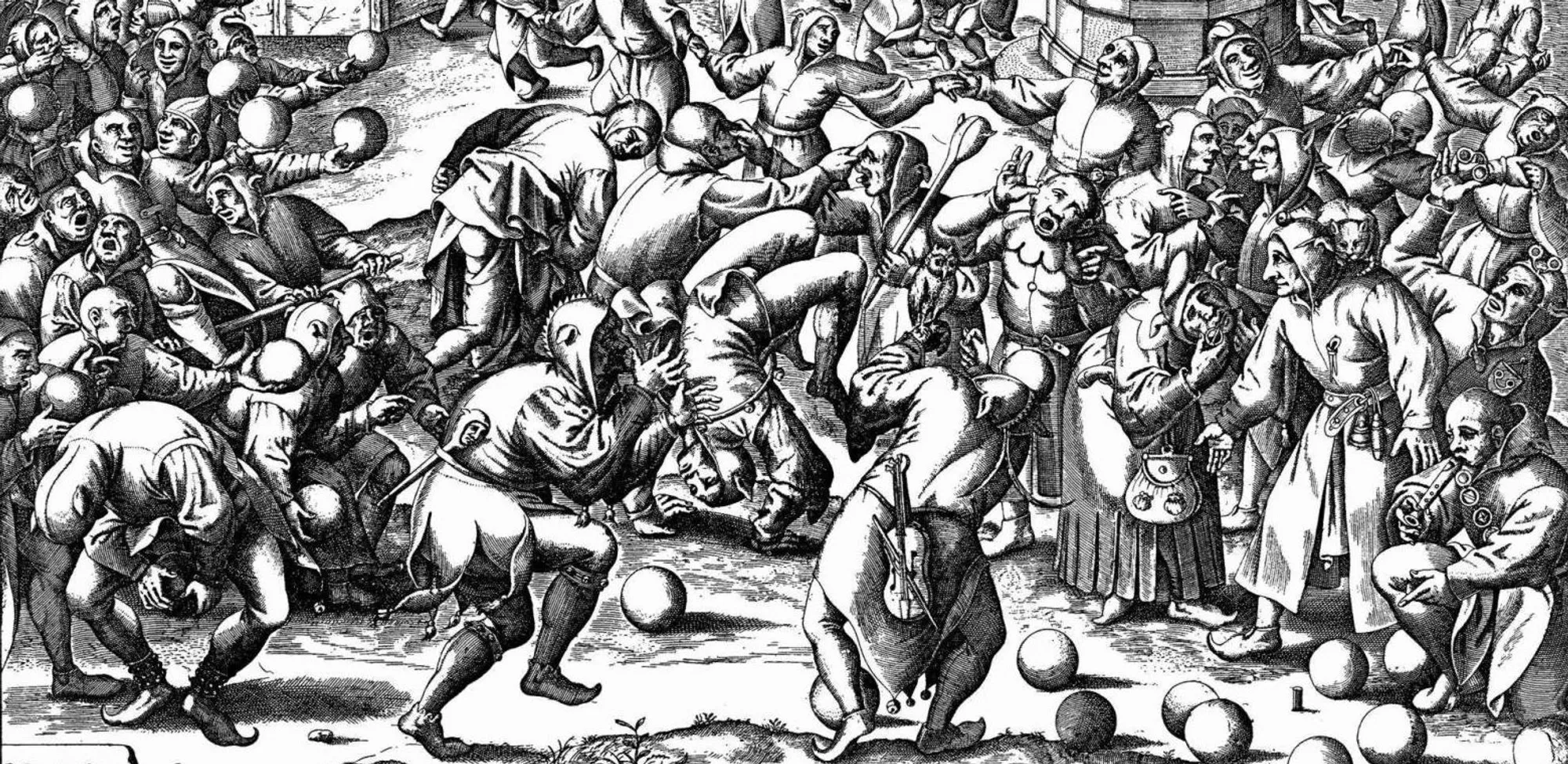Notes from the History of Laughter

In Rabelais and His World, the Russian critic Mikhail Bakhtin argues that Rabelais is the culminating literary expression of the carnival or grotesque idiom of folk humor, an idiom which had developed for over a thousand years (starting with the Roman Saturnalia) as an “unofficial” or subversive culture in the West, complete with its own rites, rules, and symbols.
The grotesque is characterized by exaggeration, incompleteness, dynamism, and becoming, which can be helpfully contrasted with later classical values like restraint, completeness, and statis. It focuses on “the material bodily lower stratum,” humanity’s earthy reality, its animating life force in eating, drinking, and procreating. It exists literally at the human body’s point of contact or merging with the exterior world—those protruding areas such as the nose, the lips, the belly, and (of course!) the genitals. Rabelais is the comic philosopher of the gut.
One of Bakhtin’s major points is that, for Rabelais and the folk culture he drew from, the material bodily lower stratum is ambivalent—that is, it expresses both death (decaying bodies, excrement, the grave) and regeneration or life (youth, sexual organs, birth). For Rabelais, these elements were essentially linked, and were inseparable from his “humanistic” or ethical vision. They were also tied to a fundamentally optimistic, joyous, or laughing outlook on life, one that stood in direct contrast to the serious “official” culture of the Middle Ages. The material bodily lower stratum not only “debases and destroys,” it “renews and regenerates” at the same time.
Later generations—including thinkers of the Enlightenment and of the Romantic, Victorian, and modern eras—misinterpreted Rabelais when they failed to see this connection and ambivalence between death and life in the grotesque. This was especially so for laughter; when laughter is separated from the regenerative, universal optimism of the grotesque, it is dismissed as frivolous vulgarity or else it becomes empty satire, something which tears down but does not build up or affirm. This is the mocking, negative satire that easily degenerates into cynicism and moralism (Bakhtin cites Voltaire in this regard; one might also cite Swift or Huxley).
A few passages on laughter develop this point further:
Rabelais, Cervantes, and Shakespeare represent an important turning point in the history of laughter. Nowhere else do we see so clearly marked the lines dividing the Renaissance from the seventeenth century and the period that followed.
The Renaissance conception of laughter can be roughly described as follows: Laughter has a deep philosophical meaning, it is one of the essential forms of truth concerning the world as a whole, concerning history and man; it is a peculiar point of view relative to the world; the world is seen anew, no less (and perhaps more) profoundly than when seen from the serious standpoint. Therefore, laughter is just as admissible in great literature, posing universal problems, as seriousness. Certain essential aspects of the world are accessible only to laughter.
The attitude toward laughter of the seventeenth century and of the years that followed can be characterized thus. Laughter is not a universal, philosophical form. It can refer only to individual and individually typical phenomena of social life. That which is important and essential cannot be comical. Neither can history and persons representing it—kings, generals, heroes—be shown in a comic aspect. The sphere of the comic is narrow and specific (private and social vices); the essential truth about the world and about man cannot be told in the language of laughter. Therefore, the place of laughter in literature belongs only to the low genres, showing the life of private individuals and the inferior social levels. Laughter is light amusement or a form of salutary social punishment of corrupt and low persons.
And another:
True ambivalent and universal laughter does not deny seriousness but purifies and completes it. Laughter purifies from dogmatism, from the intolerant and the petrified; it liberates from fanaticism and pedantry, from fear and intimidation, from didacticism, naivete and illusion, from the single meaning, the single level, from sentimentality. Laughter does not permit seriousness to atrophy and to be torn away from the one being, forever incomplete. It restores this ambivalent wholeness.